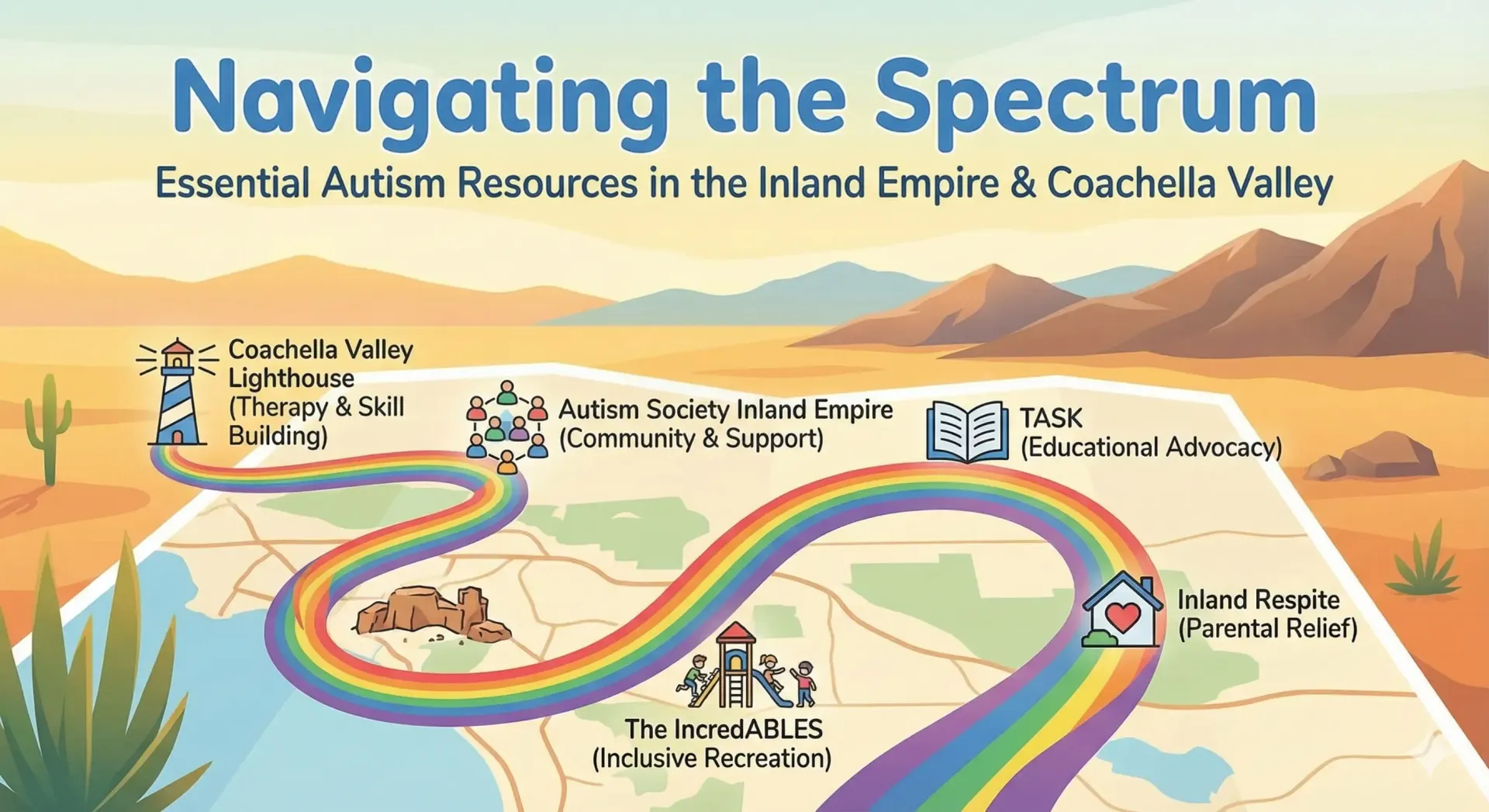ABA Therapy for Autism : Empowering Children in Imperial County
In our modern world, early intervention using ABA (Applied Behavior Analysis) offers hope for children with developmental disorders, notably autism spectrum disorders.
This article aims to delve deep into the world of early intervention ABA, exploring its importance, methods, success stories, and more.
Join us on this journey as we unravel the transformative power of early intervention ABA and its impact on the lives of children and families in Imperial County, California.
Understanding Developmental Challenges
Developmental disorders encompass a wide range of conditions affecting a child's physical, cognitive, social, and emotional development.
These conditions may result in challenges such as speech delays, behavioral concerns, and social interaction difficulties.
They often emerge early in a child's life and can persist into adulthood, significantly impacting their overall quality of life and independence.
Common developmental disorders include autism spectrum disorder, attention-deficit/hyperactivity disorder (ADHD), and intellectual disabilities.
Early diagnosis and intervention are crucial in managing these disorders, as they can help mitigate some of the associated difficulties and improve a child's long-term prospects.
It's essential for parents, caregivers, and educators to be aware of the signs and symptoms of developmental disorders and seek professional guidance and support to provide affected children with the best possible opportunities for growth and development.
Types of Developmental Disorders
Developmental disorders encompass a wide spectrum of conditions that affect various aspects of a child's physical, cognitive, social, and emotional development.
Some common types of developmental disorders include:
Autism Spectrum Disorder (ASD):
This encompasses a variety of neurodevelopmental challenges including communication difficulties, social interaction hurdles, and repetitive actions.
It can vary widely in severity, with some individuals experiencing milder symptoms while others have more significant impairments.
Attention-Deficit/Hyperactivity Disorder (ADHD):
ADHD is characterized by difficulties with attention, hyperactivity, and impulsivity.
It can affect a child's ability to focus, organize tasks, and control impulses.
Intellectual Disabilities: Intellectual disabilities involve limitations in intellectual functioning and adaptive behaviors.
These can affect a child's ability to learn, communicate, and perform daily tasks.
Specific Learning Disabilities: These disorders affect the acquisition and use of specific academic skills, such as reading, writing, or mathematics, without significantly impacting overall intelligence.
Speech and Language Disorders: These disorders can lead to difficulties in understanding or using spoken or written language, affecting communication and social interactions.
Down Syndrome: Down syndrome is a genetic disorder that leads to intellectual disabilities and distinct physical features, caused by the presence of an extra chromosome 21.
Cerebral Palsy: Cerebral palsy is a neurological disorder that affects motor skills and muscle coordination, often resulting from brain damage before or shortly after birth.
Rett Syndrome: Rett syndrome is a rare genetic disorder primarily affecting girls, leading to severe impairments in motor and cognitive function.
Tourette Syndrome:
Tourette syndrome is characterized by repetitive, involuntary movements and vocalizations known as tics.
Fetal Alcohol Spectrum Disorders (FASD): FASD results from prenatal exposure to alcohol and can lead to a range of physical, cognitive, and behavioral problems.
Genetic Syndromes:
Various genetic syndromes, such as fragile X syndrome and Prader-Willi syndrome, can cause developmental challenges.
Reactive Attachment Disorder (RAD): RAD occurs when a child has difficulty forming healthy attachments to caregivers, often due to early neglect or trauma.
Each developmental disorder has its unique characteristics and challenges, and early diagnosis and appropriate interventions are essential for helping children with these conditions reach their full potential and lead fulfilling lives.
Common Challenges Addressed by Early Intervention ABA
Early Intervention Applied Behavior Analysis (ABA) is a therapeutic approach commonly used to support children with developmental disorders, particularly autism spectrum disorder (ASD).
ABA therapy targets a variety of challenges to promote skill development and improve overall functioning.
Some common challenges addressed by Early Intervention ABA include:
Communication:
ABA helps children improve their communication skills, whether it's developing verbal language, using augmentative and alternative communication (AAC) systems, or enhancing nonverbal communication, such as gestures and sign language.
Social Skills:
ABA focuses on teaching social skills, including initiating and maintaining interactions, understanding nonverbal cues, and recognizing emotions in oneself and others.
Behavior Management:
ABA helps children manage challenging behaviors by identifying triggers, implementing strategies to reduce problem behaviors, and promoting more appropriate responses.
Functional Life Skills:
ABA targets essential daily living skills such as dressing, toileting, feeding, and self-care, enhancing a child's independence.
Cognitive and Academic Skills: ABA can address cognitive deficits and support academic development, helping children learn foundational skills like counting, reading, and problem-solving.
Play and Recreation Skills:
ABA enhances skills for play and recreation, encouraging meaningful engagement with peers and toys.
Self-Regulation:
ABA assists children in developing self-regulation skills, enabling them to manage emotions, tolerate frustration, and adapt to changing situations.
Reduction of Repetitive Behaviors: For children with ASD who engage in repetitive behaviors or restricted interests, ABA helps reduce these behaviors and replace them with more functional activities.
Generalization and Maintenance: ABA aims to ensure that skills learned in therapy generalize to different settings and are maintained over time.
Parent and Caregiver Training: A crucial aspect of Early Intervention ABA is training parents and caregivers to implement ABA strategies at home and in everyday situations, ensuring continuity of support.
Individualized Goals: ABA programs are highly individualized, focusing on the specific needs and strengths of each child, and are regularly adjusted based on progress.
Early Intervention:
ABA is most effective when initiated in early childhood, as early intervention can lead to better outcomes in terms of skill development and behavior management.
Overall, Early Intervention ABA is a comprehensive and evidence-based approach that can be tailored to meet the unique needs of children with developmental disorders, helping them acquire essential skills and improve their quality of life.
The Science of Early Intervention ABA
Methodology and Techniques
ABA is rooted in the science of behavior analysis, using systematic and evidence-based methods to modify behavior and promote learning.
Therapists meticulously craft interventions customized for each child's unique needs.
Evidence-Based Nature of ABA
The effectiveness of ABA is supported by a wealth of scientific research.
It is considered the gold standard in the field of autism therapy due to its evidence-based nature, ensuring tangible results.
Find autism therapy near me.
Real-Life Success Stories
Through the lens of real-life success stories, we witness the transformative power of early intervention ABA.
Children who once faced significant challenges have made remarkable progress, achieving milestones once thought impossible.
Qualifications of Professionals
Qualified and certified therapists are the driving force behind the success of early intervention ABA.
These dedicated professionals undergo rigorous training to provide specialized care for children with developmental disorders.
Accessing Early Intervention ABA
Navigating the path to early intervention ABA can be daunting for parents and caregivers.
Understanding how to access these services is crucial for those seeking support for their children.
Integrating ABA Techniques into Daily Life
Parents often wonder how they can incorporate ABA techniques into their child's daily routines.
Discover practical strategies for seamless integration, promoting consistent progress.
Resources and Support Networks
Building a strong support network is vital for families embarking on the early intervention ABA journey.
Discover valuable resources and organizations ready to offer guidance and assistance.
Long-Term Benefits
As we conclude our exploration of early intervention ABA, we examine the long-term benefits it offers to children and their families, emphasizing the potential for lasting positive change.
Conclusion
In conclusion, Early Intervention is crucial for children with developmental disorders, offering a scientifically proven and effective approach to improving their lives.
By understanding its importance, methods, and success stories, families in Riverside, San Bernardino, and Imperial Counties can embark on a transformative journey towards a brighter future for their children.
FAQs
What is Early Intervention ABA (Applied Behavior Analysis), and how does it work?
Early Intervention ABA, or Applied Behavior Analysis, is a therapeutic approach rooted in the science of behavior. It focuses on modifying behavior through systematic interventions to help children with developmental disorders, especially autism spectrum disorders.
Why is early intervention crucial for children with developmental disorders?
Early intervention is crucial because it can significantly impact a child's development. The earlier therapeutic interventions like ABA are implemented, the better the chances of improving social, communication, and behavioral skills, setting a strong foundation for future growth.
What are the common developmental challenges that Early Intervention ABA addresses?
Early Intervention ABA addresses a range of challenges, including speech delays, repetitive behaviors, social difficulties, and sensory sensitivities often associated with developmental disorders like autism. It aims to enhance communication, reduce challenging behaviors, and improve overall functioning.
How can parents and caregivers access Early Intervention ABA services?
Accessing Early Intervention ABA services typically involves contacting certified ABA therapists or centers specializing in developmental disorders. Parents can inquire about services, insurance coverage, and available programs to determine the best fit for their child.
What are the qualifications and certifications of professionals providing Early Intervention ABA?
Professionals providing Early Intervention ABA must hold relevant qualifications and certifications, such as Board Certified Behavior Analyst (BCBA) credentials. These therapists undergo specialized training to design and implement effective ABA programs for children with developmental disorders.
Are there success stories or case studies demonstrating the effectiveness of Early Intervention ABA?
Indeed, numerous success stories and case studies highlight the transformative power of Early Intervention ABA. Children who undergo ABA therapy often show significant improvements in communication, behavior, and overall quality of life.
How can parents integrate ABA techniques into daily routines for children?
Parents can integrate ABA techniques into daily routines by collaborating with ABA therapists to develop customized strategies. Consistency is key, and therapists can provide guidance on implementing techniques at home to reinforce learning and behavior improvements.
What resources and support networks are available for families pursuing Early Intervention ABA?
Families pursuing Early Intervention ABA can access various resources and support networks. Local autism support groups, online communities, and nonprofit organizations offer valuable guidance, information, and emotional support to parents and caregivers on this journey.
What are the potential long-term benefits of Early Intervention ABA for children and their families?
The potential long-term benefits of Early Intervention ABA are extensive. Children can develop essential skills, improve their independence, and achieve a better quality of life. Families experience reduced stress, enhanced communication, and strengthened bonds, leading to a brighter future for all.











